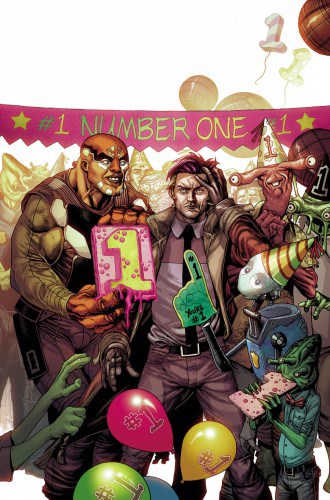Replica #1
Written by Paul Jenkins
Art by Andy Clarke
AfterShock Comics
One of the first offerings from AfterShock Comics, Replica grabbed me from the first few pages.
I love cop stories set in space.
I love them better with quirky alien races and robots as part of the storyline.
They can be loads of fun based on humour too, and that element was there from writer Paul Jenkins.
The art by Andy Clarke was OK for the genre.
I was in on this one quickly.
And then the cloning came.
Detective Trevor Churchill is the human cop in the cadre. He decides a clone is the answer to paperwork.
But the process has a wee glitch.
By the end of the issue there are a shipload of Churchills, and within a couple of pages of that, as they report in very various numbers (one-Adam-two, one-Adam-twelve), I was running out the story and figuring out what the next book to read on the night should be.
There might be some interesting ways Jenkins goes with the clones in tow, but I’m honestly not sure I care enough to read an issue two to find out.
This one just went from 60-to-zero by one screwed up clone machine.
Wild’s End TPB
Writer: Dan Abnett
Art: I.N.J. Culbard
BOOM! Studios
This is a charmingly crafted book, one that I enjoyed in spite of being a simple retelling of ‘The War of the Worlds’ with talking animals.
The preamble to the Wild’s End trade paperback, which collects issues #1-to-#6 of the comic series doesn’t suggest it is more.
“Welcome to the War of the Wilds.
“Lower Crowchurch is a small English community enjoying the peace of the 1930s, but when the town becomes the victim of an alien invasion, the residents’ lives are upended by the harsh realities of life-and-death violence. Led by the town’s outsider and retired war veteran, they will have to rally together to uncover the secret of their invaders and hope to fight back.”
Now H.G. Wells’ book is a classic, so a writer retelling the story cannot drift too far off script without worrying that he is tampering too much with such a well-known take, and writer Dan Abnett stays on course throughout. That is both a strength, as he stays so true to Wells’ work, but a downfall in that he never took any sort of risk at all.
All right Abnett and co-creator I.N.J. Culbard did opt to use anthropomorphic animals in their telling, which added to the charm in some regards, but didn’t exactly create anything stunningly new either. I suspect for some the animals might even be a turn off, although I have enjoyed when creators went down that path in books such as Tracy J. Butler’s Lackadaisy and Bryan Talbot’s Grandville. Here though, likely because the story is simply a retelling the animals add very little in terms of freshness.
And therein lies the heart if Wild’s End. There is definite ‘rural English’ charm here, and the story builds on such a classic foundation it cannot be viewed as less than solid, but if you have read ‘War of the Worlds’ you get nothing here that demands you read Wild’s End.
And if you haven’t read Wells’ classic, shame on you. And don’t buy this book as a lighter version of the original. Go out and buy the real War of the Worlds and enjoy.
That all said, if you do grab this book to read you are not likely to be disappointed, as it’s an all right read, just don’t expect to be raving with praise for it either - middle-of-the-road goodness is all you get here.




